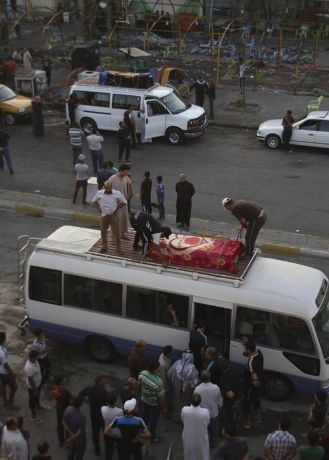News
You are here
Violence in Iraq the result of 'humanitarian intervention'

September 22, 2013
Violence in Iraq is escalating, with at least 800 people killed in August, according to the UN. More than a third of the brutal bombings and suicide attacks are taking place in Baghdad. This is the result of Western intervention dressed up as "humanitarian."
Violent attacks
On September 21, a string of bombings killed at least 96 people in the Baghdad suburb of Sadr City, Ur District and the northern city of Baji.
In Sadr City, the funeral of one person turned into a mass funeral with hundreds killed and injured. The first bomb exploded next to a tent full of mourners. During traditional funerals, men and women usually have different places to mourn. When women and children heard the bomb, they rushed to the street searching for their male relatives. Later, a suicide attack targeted the funeral and a third bomb exploded when the police and ambulance arrived on site. An eyewitness described a scene in which a young man rushed to save his friend who was injured after the second bombing; while soaked with blood from carrying his injured friend, he was killed by the third attack.
The attack on Sadr City was the most brutal and led to at least 72 dead and hundreds injured. “Hospitals are not enough to treat all the wounded. Some are being treated on the floor in the hospital’s corridors,” said Abbas Al Kusheimi from Sadr City. There have been frequent car and suicide bomb attacks targeting the city. All of the attacks happened at funerals, places of worship, busy shops and crowded areas in the city. In many cities, this year's violence has been the worst since 2008.
Resisting Saddam Hussein and US occupation
While different cities have witnessed violence, to many Iraqis, Sadr City represents resistance to dictatorship and Western intervention. It is now known as the “Enlightening Sadr City,” which inspires others in Iraq but it also faces brutality and ongoing violence.
Prior to 2003, civilians in the city faced Saddam Hussein’s oppression, repression, brutality and discrimination. The unemployment rate was very high compared to the rest of the country, and the government’s education system continuously discriminated against Sadr City’s young men and women. Many of those who showed resistance were targeted and killed, including the community’s prominent leaders. Despite all the oppression, the rebellious spirit was dominant amongst people.
When the regime was overthrown after the Western invasion, conditions never changed and the situation has been deteriorating ever since. The same city that faced the dictator’s oppression resisted the US troops. “I lost one brother during 1990’s uprising against Saddam and another brother was killed by the American forces,” a man who lives in Sadr City said. From the beginning, people realized that military intervention was not “humanitarian.”
Against 'humanitarian intervention'
The bloodshed continues in Sadr City and several parts of Iraq after the last US troops pulled out 18 months ago. The US-led invasion in 2003 is the main cause of the current violence and the corrupt government in Iraq. The US imposed a puppet regime to continue the repression and inequality of Saddam's regime, while undermining the resitance by promoting sectarian divisions—from imposing a parliament along ethnic lines, to arming sectarian death squads.
While deaths have been increasing, thousands of pro-democracy protestors have been demonstrating against corruption. One of the most noticeable demands is to cut the high retirement salaries dedicated to the Iraqi parliamentarians and government politicians. While the economic inequality is increasing, parliamentarians and government politicians are opportunistically receiving overly-generous salaries and benefits. This has outraged ordinary people who faced brutal dictatorship for decades. In the southern city, Nasiriya, the government’s forces responded to the peaceful demonstrations with teargas.
While the world’s political leaders are arguing whether Western intervention is a solution to the Syrian crisis, innocent Iraqi civilians continue to pay the price of “humanitarian intervention”. At all times, it is critical to support the masses of people and reject imperialist intervention that hijacks revolutionary movements.
Section:
Topics:










